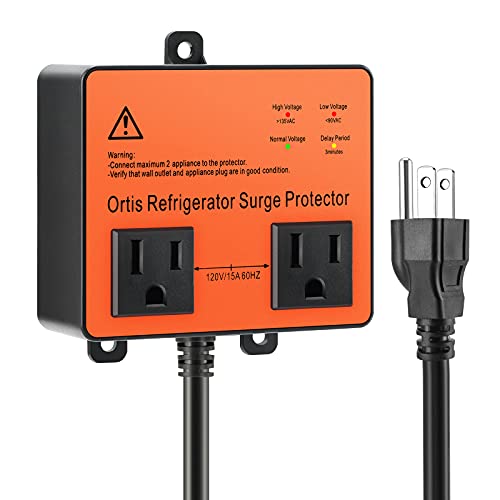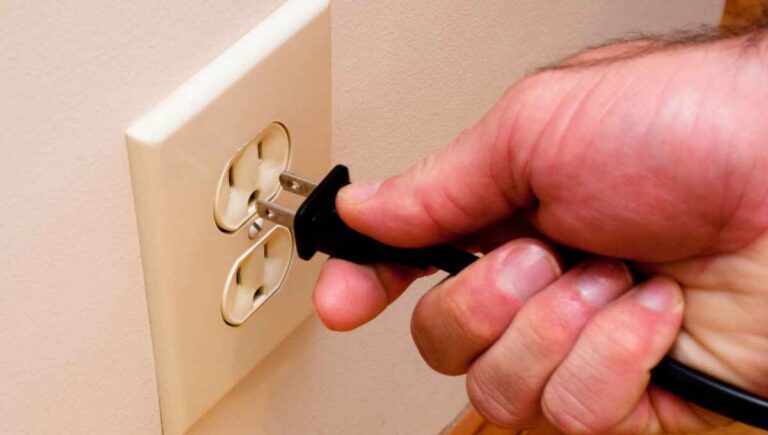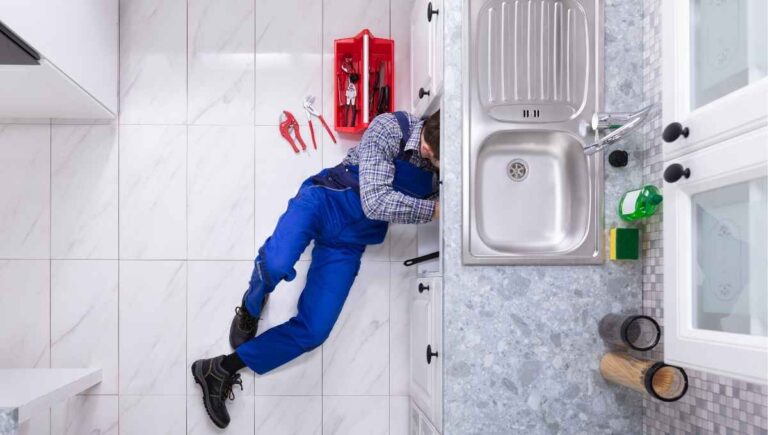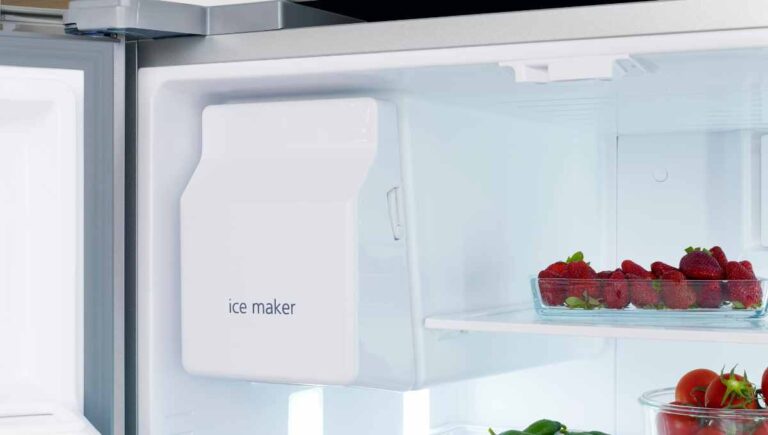Can You Plug a Refrigerator Into a Surge Protector?
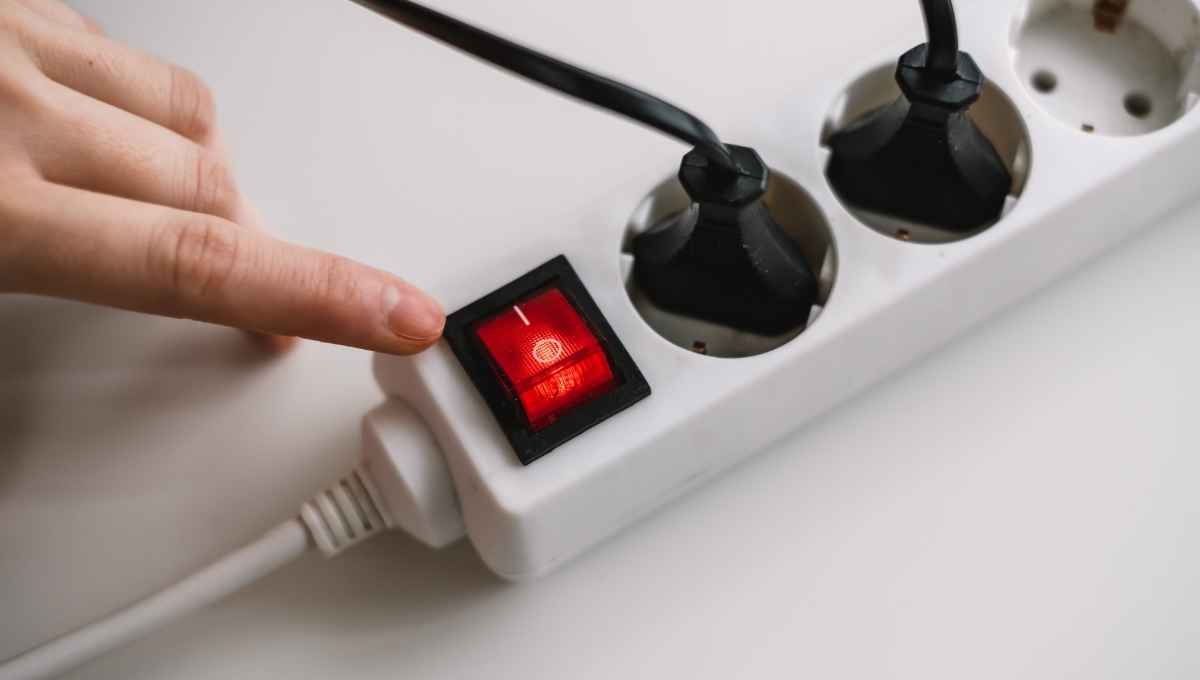
Plugging appliances into a surge protector is a common practice to protect them from power surges and voltage spikes. However, when it comes to refrigerators, the question of whether it’s safe to plug them into a surge protector often arises.
You can safely plug a refrigerator into a surge protector, but it is not recommended to plug it into a power strip. It’s important to choose the right type of surge protector and ensure that it is rated for the wattage of your refrigerator. This will help to ensure that your refrigerator is protected from power surges and also prevent damage to the surge protector.
Although built similarly, you can’t use surge protectors and power strips interchangeably. Keep reading to learn about the difference between both, how they work, how you can protect your fridge, and what you can do if there is a power outage in your area.
This post contains affiliate links. This means Household Blogger may earn a commission should you make a purchase using any of our links. Please refer to our full affiliate disclosure policy for full details.
Here’s a Quick Pro Tip!
You can plug a refrigerator into a surge protector but can’t plug it into a power strip. They are not the same because they have different voltage tolerance capacities. However, there are surge protectors designed to protect your fridge.
You can find them almost anywhere, even online. They are designed to withstand the voltage of your fridge and provide proper protection during power outages. We recommend you verify these power surge protectors:
Enigmatic Surge Protector – If you have a big refrigerator, you may want to check this power surge. Since it has a high voltage capacity, it can protect your fridge whenever a power surge happens.
Ortis Double-Outlet Surge Protector – This surge protector protects two high-capacity appliances. It does not only protect from power surges, but it also protects from spikes. It can also aid in increasing your fridge’s longevity.
Appliance Shield Surge Protector – You need a surge protector that can tolerate your fridge’s voltage. Luckily, this surge protector is capable of tolerating 2000 watts. It’s perfect for protecting your fridge from power fluctuations. Thus it will last longer.
Refrigerator and Surge Protectors
Surge protectors come in different shapes and sizes, but these don’t determine their effectiveness. So, let’s talk about what type of surge protector your fridge needs, how to determine if you need one and what you need to consider before getting one.
Is It Okay to Plug a Fridge Into a Surge Protector?
You can plug your refrigerator in a surge protector designed to withstand the voltage of the fridge, but you cannot plug it into a power strip. While both terms have been used interchangeably, they’re not the same.
A surge protector is a tool that helps protect your appliances from electrical spikes and power surges, and there are ones made exclusively for fridges. On the other hand, power strips are only meant to add more slots into an outlet and will not protect your appliances.
Do I Need a Special Surge Protector for My Refrigerator?
Your fridge needs a surge protector capable of tolerating the refrigerator’s voltage, which you can find online. In addition, some companies sell surge protectors for refrigerators, which come with sophisticated features.
Most of these refrigerator surge protectors can cover from 1200 to 1800 watts. Nevertheless, the higher the watt tolerance capacity, the more effective it is. So, it’s recommended that you find a surge protector that tolerates 1800 watts.
Should Refrigerators Be Plugged Into Surge Protectors?
It would be best if you plugged your refrigerator into a surge protector, as this will increase the level of safety of your home. If you decide to do this, ensure that the surge protector tolerates 15 to 20 amps, depending on your type of fridge.
Many recommend not plugging refrigerators into surge protectors because fridges already have a protective system to prevent damage from power surges. Others confuse power strips with surge protectors, deeming them the same when they’re not.
What Size Surge Protector Do I Need for My Refrigerator?
The surge protector you need for your refrigerator is not measured in size but in voltage capacity, joules or watts. Therefore, the protector you need must cover at least 1000 watts to protect your refrigerator effectively.
On average, standard refrigerators power up to 1200 to 1500 watts. So it’s recommended to get a surge protector that’s a bit higher than your refrigerator’s watts or volts. That way, there is less risk of damage.
What Is the Best Surge Protector for a Refrigerator?
The best surge protector you can choose for your refrigerator tolerates around 1500 to 1800 watts and provides a good delay time of at least three minutes. It’s best to choose one meant for heavy-duty purposes as it will provide better protection.
Here are some best surge protectors for refrigerators available on Amazon:
- Refrigmatic Surge Protector for Big Refrigerators – This surge protector protects your fridge from drastic voltages. It fits large freezers and fridges and has a rotating plug to increase convenience.
- Protect-RF Refrigerator Protector – This power surge can take up to 1800 watts, has a 4-minute delay time, and can indicate different modes depending on the device’s function. They are recommended for heavy-duty items!
- Orits Refrigerator Surge Protector – With double outlets, this surge protector will help prevent spikes from damaging your fridge. However, you can add another appliance that needs the same protection.
Surge Protectors
Surge protectors are amazing, but not all work to protect your fridge. Your refrigerator needs a surge protector capable of tolerating the watts of your fridge. Let’s talk about them below so you can understand how they work.
What Would Happen if I Plug a Refrigerator Into a Surge Protector?
If you plug a refrigerator into a surge protector, it will take a three-minute delay (on average) to start powering your fridge. However, the same does not happen when you connect a power strip to a refrigerator.
A surge protector’s job is to protect your fridge or other heavy appliance from getting harmed due to voltage and power fluctuations. And although some power strips can provide a level of protection from these incidents, they are not meant for heavy appliances.
How Many Joules Do I Need for a Refrigerator Surge Protector?
You need a refrigerator surge protector that is 2000 joules or higher to tolerate the voltage of your fridge. Anything lower than that is not recommended due to the risks and hazards that can arise from it if an electrical spike, surge, or short circuit occurs.
If an electrical surge occurs and you have the wrong type of surge protector, there is a high probability that your fridge will not work as well after. It will turn off your breaker or blow off your fuse. The latter is worse because you’d have to invest in a replacement.
Will a Power Surge Damage My Refrigerator?
The rush of electricity from a power surge can damage your refrigerator parts, thus compromising its overall functionality. In addition, the surge can cause your fridge to heat up and end up ruined.
This drastic energy fluctuation can harm one of the most important parts of a refrigerator, which is the compressor. Replacing and fixing this part can take time and be costly, so you should take all the necessary measurements to protect your appliances.
Does My Refrigerator Need a Surge Protector?
It’s not always necessary to purchase a surge protector, but it is highly encouraged to get one to prevent damage to your refrigerator. You must check the voltage of your refrigerator to choose the correct protector for your fridge.
Specifically, you should look for a power surge protector meant for refrigerators. That way, you’ll avoid confusion and hassles when searching for one. Since people use the term “surge protector” and “power strip” interchangeably, it can happen too often.
Can You Plug a Fridge Into a Surge Protector or Power Strip?
You can plug a fridge into a surge protector designed for it, but you can never plug it into a power strip because this can lead to major damage. Surge protectors are meant to protect big appliances from drastic power fluctuations, but power strips aren’t.
Power strips only aid you in adding more slots so you can connect more appliances. Some may come with features that allow them to prevent short circuits and surges from damaging your small appliances, but they are not entirely safe from them.
Power Outages
Power outages are a problem because they have the potential to damage essential appliances in your home. However, there are things you can do to avoid these damages. Let’s talk about what you can do to protect your fridge during a power outage.
How Do I Protect My Refrigerator During a Power Outage?
To protect your refrigerator during a power outage, you can try turning off your home’s breakers to ensure equal protection for all your appliances. However, if you don’t feel comfortable with this, you can simply disconnect your fridge.
Disconnecting your fridge is recommended because it will prevent a power surge on it since it won’t receive the electrical rush from the power coming back. However, there are other precautions to take regarding the perishable food inside.
Do Surge Protectors Protect Against Power Outages?
Surge protectors don’t protect against power outages, but they protect against surges that can occur after a power outage. Power outages occur for different reasons, not always related to the appliances in your home.
Power surge protectors only help prevent the worst after power comes back. They do not prevent power outages from happening. Therefore, you should get one to protect your big and small appliances.
Should I Turn Off My Fridge During a Power Outage?
It’s not practical to turn off your fridge during a power outage since, in essence, your fridge would automatically turn off during this incident. However, you can unplug your fridge during a power outage to protect it from a power surge happening when the power returns.
Generally, having a power surge protector can aid you in preventing this. In that case, it wouldn’t be necessary to unplug your fridge because the protector works to prevent those surges.
Should I Unplug My Refrigerator During a Power Outage?
Unplugging your refrigerator and other heavy appliances during a power outage is recommended to protect them from any electrical damage arising from drastic electric fluctuations. Thus, you should not hesitate to do so.
When power comes back after an outage, it can do so drastically and thus provoke a power surge that can affect your appliances. So not only is it recommended to disconnect your fridge during this incident, but you should unplug your other appliances as well.
Why Is My Fridge Tripping the Power?
When your fridge is constantly tripping the power, it could indicate damage to its compressor, which must be resolved immediately before it starts causing damage. You can consult with a professional for more details.
Power tripping can occur after the fridge’s compressor attempts to run cooling ice. It could imply an issue that causes it to overload electricity, and thus it tips your breaker off. You should ensure to replace it before it starts affecting your groceries long-term.
What Can Damage a Refrigerator Compressor?
A power surge or poorly added refrigerant can damage a refrigerator compressor or indicate an issue related to the condenser coils your fridge needs to keep its fan blowing cool air.
A power surge can affect the functionality of the compressor, thus causing it to work improperly. Likewise, if you add too much refrigerant or too little, your fridge won’t cool, and thus it will end up damaging the compressor.
Related Questions
What Should You Not Plug Into a Surge Protector?
If you use a power strip “surge protector,” you should not plug heavy-duty appliances like coffee makers, washing machines, or dryers into it. This is because the voltage the protector needs to protect these machines may not always match, and thus it can become hazardous.
Keep in mind that power strips and surge protectors are used interchangeably, but they don’t mean the same thing. In this case, we’re using surge protectors to refer to power strips for the sake of comprehension.
Power strip surge protectors are not meant to protect appliances from overflowing electrical surges. They only aid you in adding more slots into an outlet or better access to connect appliances like laptops, lamps, chargers, and so on.
What’s the Difference Between a Surge Protector and a Power Strip?
The difference between a surge protector and a power strip relies on two things: their design and their capacity. Power strips can withstand lower voltages, while surge protectors can withstand high-level volts.
Therefore, surge protectors protect high-capacity appliances from power surges, spikes, and electrical shorts. However, power strips will give you more accessibility to an outlet. They are mostly used when connecting a laptop, a desk computer, a TV, or a videogame console.
Even if both terms describe the same thing, you should be careful when purchasing. Because of this confusion, many brands will sell their power strip and disguise them as surge protectors. Therefore, we recommend you keep an eye on them to avoid distress.
What Appliances Should Be on a Surge Protector?
Appliances that should be on a surge protector include a washing machine, a refrigerator, an electric stove, microwaves, and coffee makers. A good surge protector that matches their electric capacity will protect them from extreme power fluctuations.
Using a power surge protector is also recommended if you live in an area prone to power outages and other electrical issues. For example, a person that lives in a house that suffers power voltage fluctuations daily may want to purchase a surge protector.
Final Thoughts
Surge protectors can protect your home and appliances in cases of emergency, but you should be cautious and ensure that you purchase the correct type. We hope this article helped clarify the differences for you!


